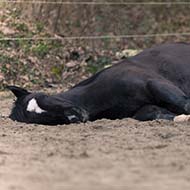
The CPD course is the first of its kind for UK equine vets.
The British Equine Veterinary Association (BEVA) has introduced a new CPD post-mortem course. Named 'Finding answers after life', the course will be held at the University of Surrey on Wednesday 20 October 2021.
Worth seven CPD hours, the course is hands-on, and will combine lectures, practical sessions, and a Q&A session. Organised by Dr Nicola M Parry, the event will see delegates learn from speakers Dr Fabio Del Piero from the Louisiana State University, and Dr Marvin J Firth from the University of Surrey.
The course aims to equip delegates with the knowledge and confidence to carry out an equine post-mortem, identify common and uncommon pathologies, and draw conclusions as to the cause of death.
In the morning, delegates will attend lectures providing an overview of techniques that focus on how to approach the post-mortem examination of the adult horse and foetus/foal, alongside how to examine the placenta. Pitfalls to avoid during the examination, how to optimise sample submission, and potential findings will also be discussed.
Delegates will then spend the afternoon in the post-mortem room, and will have the chance to examine macroscopic specimens and learn practical approaches to a post-mortem examination in the field, alongside the collection of key specimens.
Closing with a Q&A session, the day promises to be a unique experience, as the first course of its kind in the UK's equine veterinary sector.
Learning manager at BEVA, Sarah Gaspar, commented: “If you have ever been called out to a dead horse to find a distraught owner and not been sure how to identify the cause, this course is for you.
“We can’t remember any course ever having been run on this topic in the UK before; it is likely to be very popular so be quick to book.”
The course costs £445 for BEVA members and £890 for non members.
More information about the event and booking details can be found here.



 The Federation of Independent Veterinary Practices (FIVP) has announced a third season of its podcast, Practice Matters.
The Federation of Independent Veterinary Practices (FIVP) has announced a third season of its podcast, Practice Matters.